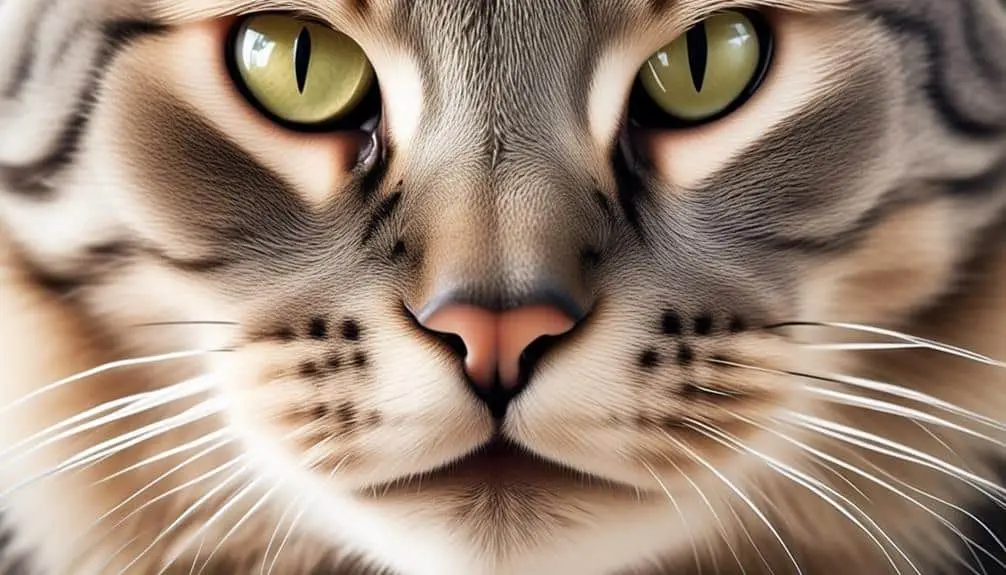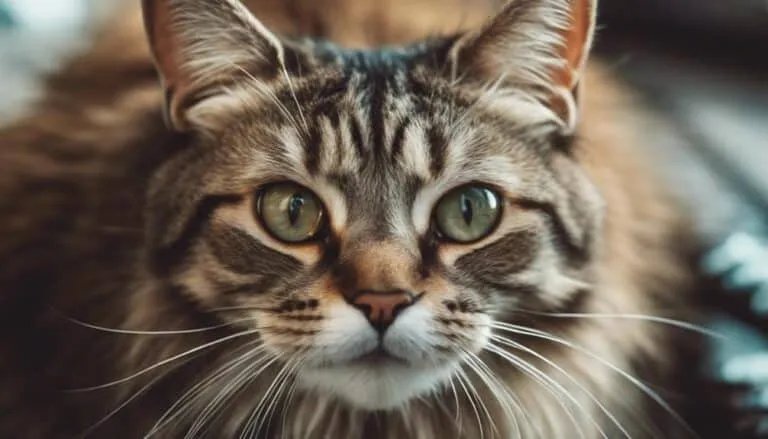The Best Fluffy Pancakes recipe you will fall in love with. Full of tips and tricks to help you make the best pancakes.

As you stroke your cat's soft fur, you notice something peculiar – a subtle but unmistakable puffiness in their lip. Your curiosity piques, and you can't help but wonder what could be causing this mysterious swelling. Could it be a harmless reaction to an insect bite, or is it something more serious lurking beneath the surface?
In this article, we will unravel the nine possible reasons behind your cat's puffed-up lip, shedding light on each possibility and offering insights into their diagnosis and treatment.
So, prepare to embark on a journey of discovery as we uncover the secrets behind your cat's enigmatic lip swelling – a journey that might just hold the key to your feline companion's well-being.
Key Takeaways
- Allergic reactions to food or other substances can cause swelling in a cat's lip. Switching to a different brand or flavor of food may help identify and alleviate the allergy.
- Insect bites and stings, particularly from fleas, ticks, mosquitos, or mites, can cause lip swelling in cats. Recurring bites may indicate a flea infestation.
- Toxic reactions from ingesting something harmful, such as certain plants, can lead to lip swelling in cats. Other signs of poisoning, like vomiting and diarrhea, may also be present.
- Dental issues, infections, immune system diseases, tumors, feline acne, and eosinophilic granuloma complex can all be potential causes of lip swelling in cats, requiring a veterinary assessment for proper diagnosis and treatment. Regular dental care and hygiene practices can help prevent certain issues.
Allergic Reactions
If your cat's lip suddenly puffs up, it could be due to an allergic reaction. Food allergies are common in cats, with specific meat proteins being potential allergens. If you suspect a food allergy, consider switching to a different brand and flavor of cat food.
Another possibility is an allergy to something else that the cat regularly touches, such as a toy or food dish. To diagnose an allergic reaction, observe if there's improvement after changing the food or removing the potential allergen.
It's important to be vigilant about common allergens and take necessary precautions to prevent further reactions. By identifying and managing food allergies, we can ensure the well-being of our feline companions.
Insect Bites and Stings
After discussing allergic reactions in cats, let's now explore the subtopic of insect bites and stings, which can also cause your cat's lip to puff up.
Insect bites and stings, such as those from fleas, ticks, mosquitos, and Demodex mites, can result in lip swelling. Cats with less fur around their lips are more vulnerable to these reactions. Additionally, if your cat tries to bite or pick up a bee, it may get stung, leading to lip swelling.
In most cases, insect bites and stings heal on their own. However, if your cat experiences recurring bites, it may indicate a flea infestation that requires treatment. To recognize and treat bee stings, look for the presence of a stinger and remove it if possible. Applying a cold compress and monitoring your cat for signs of an allergic reaction are also important.
Toxic Reactions
Toxic reactions can cause your cat's lip to puff up, often as a result of ingesting something toxic. Here are some important points to consider regarding toxic reactions in cats:
- Common household toxins to avoid for your cat's safety:
- Certain plants like lilies, poinsettias, and pothos can be toxic if ingested by cats.
- Human medications, such as acetaminophen and ibuprofen, should be kept out of reach.
- Cleaning products, including bleach and ammonia-based solutions, can be harmful if ingested.
- How to treat and prevent toxic reactions in cats:
- If you suspect your cat has ingested something toxic, contact your veterinarian immediately.
- Treatment may involve inducing vomiting, administering activated charcoal, or providing supportive care.
- Prevent toxic reactions by keeping toxic substances securely stored and out of your cat's reach.
Tumors
Tumors in cats can manifest as small growths around the mouth and lips, and they require a veterinary assessment for diagnosis. These tumors can be either benign or cancerous and are more common in elderly cats. If you notice any unusual growths or swelling on your cat's lips, it's important to have them examined by a veterinarian.
The prognosis and treatment options for tumors depend on the type and stage of the tumor. In some cases, surgical removal may be recommended, while in others, medication or other therapies may be used. Regular monitoring and follow-up appointments are essential to ensure the best possible outcome for your cat.
Remember to consult with your veterinarian to determine the most appropriate treatment plan for your cat's specific situation.
Dental Issues
If your cat is experiencing swelling around its mouth, it may be indicative of dental issues that require attention from a veterinarian. Dental problems can cause discomfort and pain for your cat, and it's important to address them promptly. Here are some common causes of lip swelling in cats related to dental issues:
- Broken tooth: A broken tooth can lead to infection and inflammation, causing the lip to swell.
- Abscess: An abscess is a pocket of pus that forms due to infection. It can cause swelling and pain in the surrounding area.
- Tooth rot: Tooth decay can lead to the destruction of the tooth structure, resulting in inflammation and swelling of the lip.
- Other signs: When examining your cat's mouth, you may notice other signs of dental disease such as red or bleeding gums, bad breath, or difficulty eating.
Treatment options for dental issues in cats may involve surgery to remove broken teeth or abscesses, medication to control infection and inflammation, and regular dental care to prevent further issues. It's important to consult with a veterinarian for an accurate diagnosis and appropriate treatment plan.
Infections
When addressing the swelling around your cat's mouth, it's important to consider the possibility of infections as a potential cause. Various infections can lead to swelling around the cat's bottom lip. Fungal infections, such as ringworm, or bacterial infections in cuts or wounds may be the culprit.
Common symptoms and signs of infections in cats include redness, pain, discharge, and an unpleasant odor. If you suspect an infection, it's crucial to seek veterinary care for proper diagnosis and treatment. Treatment typically involves antibiotics or antifungals, depending on the type of infection. Proper wound care is essential for preventing infections and promoting healing.
Additionally, practicing good hygiene and keeping your cat's living environment clean can help prevent the occurrence of infections. Regular veterinary check-ups and vaccinations also play a crucial role in preventing infections and maintaining your cat's overall health.
Immune System Diseases
One potential cause of swelling around your cat's mouth is immune system diseases.
One common immune system disease that can cause swelling and other skin issues is pemphigus. Pemphigus is an autoimmune disease where the immune system mistakenly attacks the skin cells, leading to inflammation and blistering. The swelling can occur on the lower lip and other areas of the cat's skin.
To diagnose pemphigus, a skin biopsy is necessary.
Treatment options vary and not all cats respond well. Some treatment options may include immunosuppressive medications, such as corticosteroids or immune-modulating drugs. Regular monitoring and management of the immune system are necessary to control the disease and prevent flare-ups.
It's important to work closely with your veterinarian to develop a pemphigus management plan that suits your cat's individual needs.
Feline Acne
After discussing immune system diseases that can cause swelling around your cat's mouth, let's now explore the subtopic of Feline Acne.
Feline acne is a common condition that can cause pimples, swollen areas, and clogged pores on your cat's chin. The exact cause of feline acne is often unknown, but it's believed to be related to overactive oil glands or poor grooming habits.
Effective treatment options for feline acne include changing your cat's food dish to a non-plastic material, improving cleaning practices, and using topical or oral medications if necessary. It's important to note that feline acne is usually a minor problem and can be easily managed with regular cleaning and hygiene practices.
To prevent recurrence, make sure to regularly clean your cat's chin and monitor their grooming habits.
Eosinophilic Granuloma Complex
Eosinophilic Granuloma Complex is a condition characterized by small swollen lumps called granulomas that can develop around your cat's lips. The exact cause of this condition is often unknown, although allergies can sometimes play a role.
When it comes to treatment options, anti-inflammatory drugs are commonly used to reduce the swelling and inflammation associated with eosinophilic granulomas. These medications can be administered orally or applied topically, depending on the severity of the condition.
It's important to note that while eosinophilic granuloma complex is generally easy to treat, regular monitoring and management may be necessary to prevent recurrence. Prevention strategies for this condition may include identifying and avoiding potential allergens, maintaining good oral hygiene, and providing a well-balanced diet for your cat.
Conclusion
In conclusion, understanding the potential causes of lip swelling in cats is crucial for their well-being. Whether it's an allergic reaction, insect bite, tumor, dental issue, or one of the other mentioned possibilities, identifying the issue and seeking veterinary care is essential.
By being proactive and informed, you can help restore your feline friend's comfort and ensure their overall health. So, don't let the mystery linger – take action and give your cat the care they deserve.








